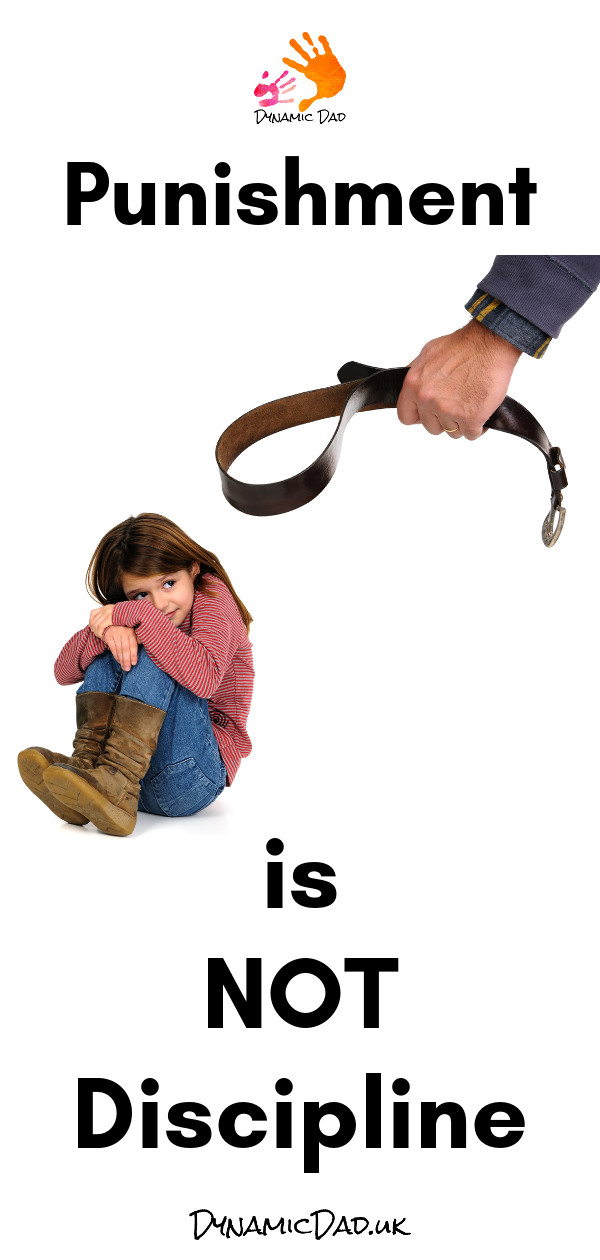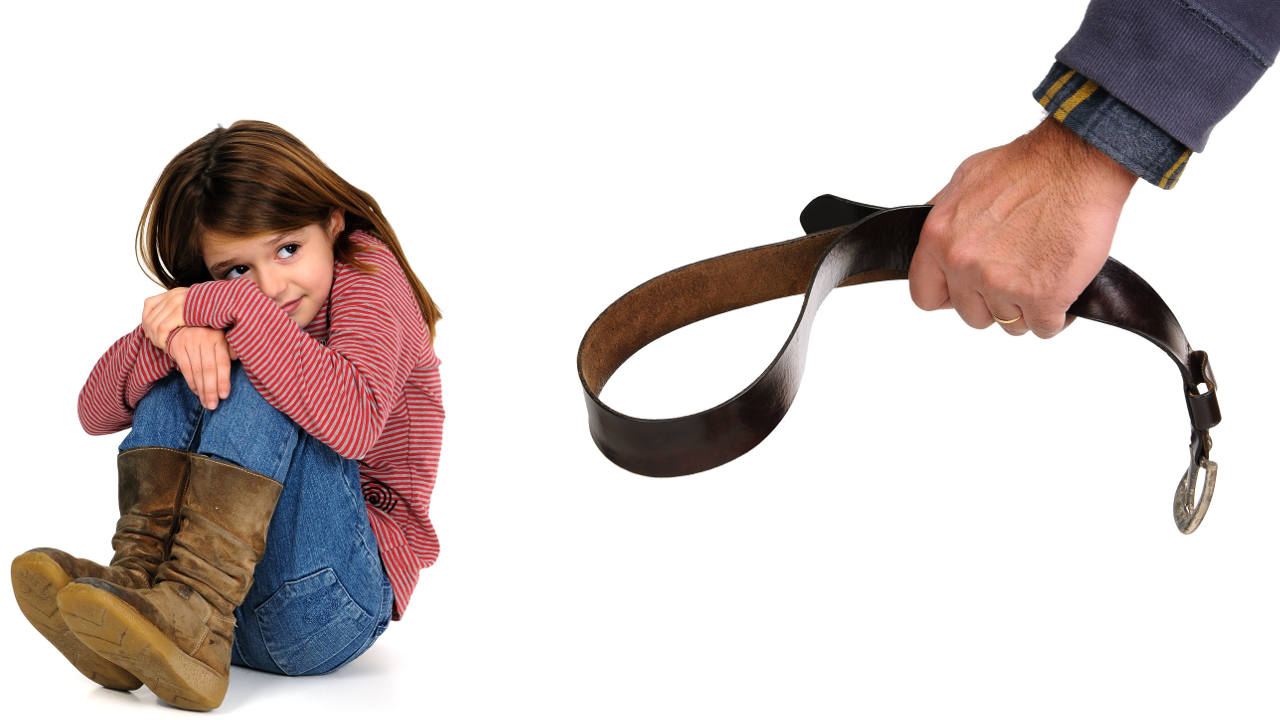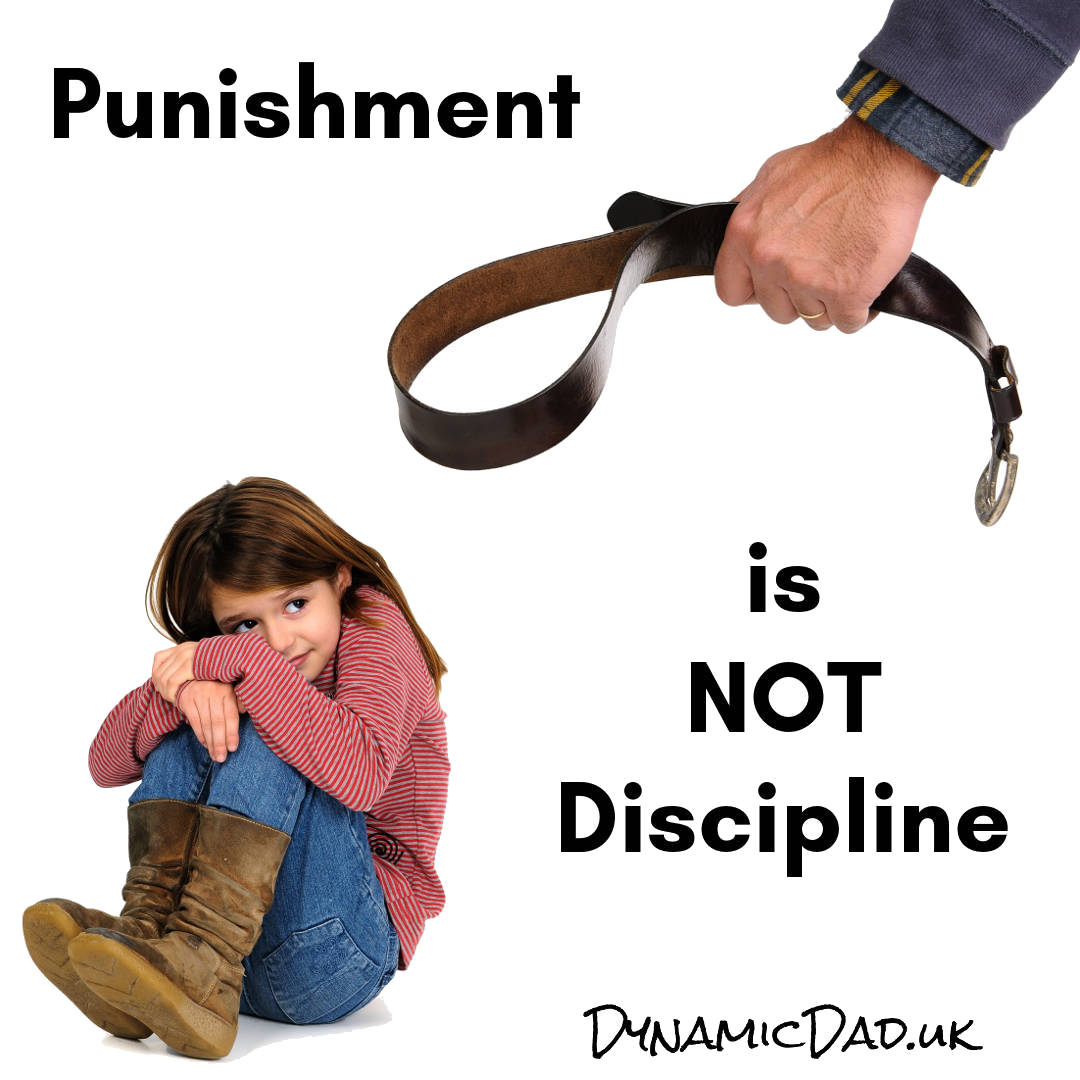Why discipline is not punishment
This image, I hope, is how most of us agree how not to do things. This is not ‘discipline’, this is punishment, if not abuse.
I hear and over hear so many people, parents and otherwise, saying things like “Children just aren’t disciplined these days”.
I’d like to explore how to raise disciplined children, but what is discipline anyway? Do we need it? Why?
Children – and adults – need discipline.
The OED defines “Discipline” as: “the practice of training people to obey rules or a code of behaviour, using punishment to correct disobedience.”
Let’s follow this through.
“Punishment” is “the infliction or imposition of a penalty as retribution for an offence.”
“Retribution” is “punishment inflicted on someone as vengeance for a wrong or criminal act.”
Well that’s a bit circular, so I’ll interpret (liberally)…
Discipline is the art of training using penalties to achieve desired behaviours.
This sounds a bit nicer.
Don’t get me wrong – I’m not normally one who goes for things that ‘sound’ nice. However, when it comes to children – I’m pretty comfortable that punishment – especially the societal perception of punishment – is not effective.
Penalties, on the other hand, are.
In my opinion:
Punishment = excessive penalties designed to assert authority.
Penalties = removal of privilege.
Privilege = a special right, advantage, or immunity granted or available only to a particular person or group.
Chores = life skills. Tidying their bedroom is not a penalty, they should be doing this anyway!
Yes, I’m throwing a lot of definitions out there. Sorry #notsorry
We, as parents, shouldn’t need to assert our authority. We should be respected. Respect however, is earned. To earn respect, we need to encourage and praise successes, as well as deliver appropriate reprimands when necessary.
If you really need to penalise your kids, take away a privilege.
Remove the games console, TV or iPad. ‘Ground’ them… for a specified period. But, you must do it consistently!
Don’t threaten. Only use penalties that you will actually follow through on – and make sure they are proportional to the offence, not to your current emotional state.
We’ve all heard it, and some of us will have said it: “If you do that again I’ll take it and throw it away”.
Will you though?
Probably not.
This then, is not how to raise disciplined children.
If you say you’ll throw the toy away, or ground them over Prom, you need to actually do it.
No this isn’t harsh – it is your poor choice of penalty.
It is probably better, and just as effective, to take the toy away for a period of time – or whatever age appropriate penalty applies – just as long as it is something that you can and will deliver on.
It’s tough, I’ll grant you. I find myself saying things I instantly regret. I’m getting better though – and I follow through.
This is the point. If you set a penalty that’s proportional to the offence, you’ll find it easy to follow through and deliver.
If, however, you pick the first punishment that makes it through the red mist when you’ve asked, told, demanded, cajoled and threatened – you will either say or do something that is wholly disproportionate, or you’ll not do it at all.
In either case, you will lose the respect of your child and any witnesses – your other children, partner, teachers, etc.
Respect is earned – and it will take a lot of work, and consistency – to earn back the respect lost by delivering either a disproportionate penalty (punishment), or none at all.
Set boundaries and enforce them.
Some boundaries are clear – don’t touch, don’t take, do eat… others less so, like when they’re taking an age to put their shoes on and you’ve run out of time, or patience.
This is where a reminder is required, but make sure you separate the boundary from the penalty, and that both are clear.
Many parents count, and it can be effective – if…
It’s 1, 2, 3, penalty.
Not 1, 2, 2½, 2¾ etc.
We do this because we don’t like our kids to fail, and we don’t like to punish them. That’s why I’m exploring the differences between discipline and fear.
“I’m going to count to three, and if you’ve not started X, then Y will happen” is not the same as “If you’re not ready by the time I get to three I’m going to… A and B and C and …”
The subtle difference in the delivery makes it clear that there is a boundary, a task and a penalty – rather than an unknown.
For example:
What is “ready”? – shoes, shoes and bag, shoes and bag and coat, shoes, bag coat and…?
What is the penalty? Have you set one – or is it implied and as yet undecided?
Children and adults alike need clear, defined goals and boundaries.
This means that you need to act to enforce any boundaries you have set promptly. If you wait until you’re frustrated, you’ve waited too long.
“Y will happen” is a statement of fact, as opposed to an “I’m going to [threat of punishment]”.
Disciplined children know the consequences of their actions.
Note, however, that…
With great power comes great responsibility.
You need to check yourself, or ideally you need to check one another. The safest approach is to set the penalty either beforehand, or after you’ve cooled down.
Not in the heat of the moment.
If you set penalties while you’re seeing red, they are almost inevitably excessive. This results in either you backing down (undermining both the rule and the penalty) or resentment and possible rebellion when you enforce it.
Don’t put yourself in this position.
It’s really important that we review our boundaries and penalties to ensure they are appropriate and effective, often. We need to make sure we have left enough room for our children to grow – that we are not attempting to control them.
When we do make revisions – in either direction – we need to tell them. We are all going to make mistakes though. We’ll set too lenient or severe boundaries and penalties, and they’ll either never go near them or they’ll march straight over them.
Forgive.
At the risk of sounding soppy, love conquers all.
It does. I love my daughter, she loves me. She messes up. I mess up. We forgive and we learn from our mistakes. Often she will be upset that she’s lost some privilege – and this is the opportunity to explore why, what behaviour was it that led to a loss of privilege.
Doing this together helps her understand how her actions have affected the outcome (rather than just being told), but also allows her to call me out if I’ve not kept my end of the bargain – if I’ve moved the goalposts or extended a penalty for an otherwise minor and essentially unrelated infraction.
It is also important to reflect alone too. If boundaries are flattened in rebellion – were they too restrictive? If they’re never even tested, are they too lenient? Are penalties seen to be so severe that exploring the limits, learning and growing as an individual is stunted?
Let’s face it – society wouldn’t be where it is today if it weren’t for the centuries of pioneers, rule breakers and activists.
These actions are as important for building trust and respect, respect that leads to discipline, as the boundaries and penalties themselves.
Avoid physical punishments.
There is rarely a need to get physical with children. You are much stronger than they are, and using force will only serve to demonstrate to your kids that they can solve their problems with force – i.e. getting into fights.
There are times you may need to smack their hands away from a hot stovetop for example – and I believe this to be entirely appropriate. You’re inflicting a momentary shock instead of the lasting effects of a burn – and it’s faster and safer than trying to explain “don’t touch, hot” in the time you have available.
In circumstances other than this and similar though, physical solutions are likely to be detrimental.
Define and teach the desired behaviours.
What are the desired behaviours?
This is a very good question, and entirely open to interpretation by you.
I believe, firstly, that perseverance comes at the top of the list.
Why?
Because studying is hard. Business is hard. Life is hard.
The tenacity to carry on, to continue to try, to persist and to achieve is not just highly valuable, it is imperative to success.
After that, come the values; respect for self and others, compassion, empathy and charity.
These are important for building relationships throughout life, if you do not respect yourself others will not.
If you do not respect others, they’ll be unlikely to respect you.
Compassion and empathy are not only a form of respect, but they allow you – and your children – to see things from the perspective of others and to understand how they feel, and why.
Charity in childhood need be no more than sharing their toys, but it sets the tone for later life.
I’m not preaching that you and your children should be donating – rather that understanding the value of sharing is key. If you share a little knowledge with someone who needs it, they are more likely to share knowledge – or skills – that you need.
You will probably also find that others are willing to help you, because they witnessed you – or your child – helping someone else. Again, this doesn’t have to be a financial ‘charitable’ action, it is simply about sharing something in order to help.
Charity breeds charity. You may or may not be the recipient, and this is unimportant.
Next, teach balance.
You may consider that I’m missing a few things – but I believe that most of these will fall under balance.
Our children should be both proud and humble, they should accept and challenge, they should form their own opinions as well as explore other ideas…
You will have your own expectations of how children should behave and be brought up, they will differ to a greater or lesser degree from the next person.
Whatever your desired behaviours are, make sure that they are clear – to both you and your children. They can’t deliver them if they don’t know what they are – and you can’t judge their achievement if you don’t either.
To demand discipline from our children, we must first be disciplined ourselves.
By giving our children clear guidelines on what we expect, as well as the knowledge and tools to achieve our expectations, they can become the respectful, disciplined and successful people we – and they – want them to be. Without ever feeling the need to punish them.
Do you agree? What are your thoughts?








PREACH! Must admit I’m crap at follow through. I’m always threatening things and then don’t have the energy to actually do it. Not surprisingly, he’s caught on.
I completely agree with this. Besides the odd moment of fury where I’ve screamed at the boys to stop fighting, generally our household routine takes charge and keeps everybody in check!!
You make a good point about routine – it’s really important and implemented properly helps reduce stress too.
100% agree with you it’s not and forgiveness is so important both ways excellent read Thank you for linking to #Thatfridaylinky please come back next week
Totally agree with you on this one. As a child growing up in the 70’s and 80’s the belt was a form of discipline used on us. Stepping out of line – we would be punished for our actions. But having kids today I don’t want to instill that kind of fear in them. And I never want to be in a position where I am blinded by anger and totally lose control over the situation. So we talk to our kids about their actions and taking responsibility for it and by doing so we take priviledges away and we enforce it. My kids absolutely hate it when this happens but that is the only way they will learn #dreamteam
I have no doubt they do – but they’ll certainly appreciate it in the fullness of time!
My parents took away privileges and it always worked to make me shape up! #DreamTeam
Completely agree with you and discipline and good manners are very important. We’re currently choosing a secondary school and our first choice was chosen largely because of those values!
I am terrible for following through. Threat after threat after threat! I do struggle with this side of parenting- my 6 year old is full of attitude!
Don’t worry – just following through on one or two will make the world of difference and they’ll catch on fast. This is probably the only instance where “This hurts me more than it hurts you” actually applies.
One thing I have always been really clear on is that if I threaten something I will follow through, so I’m careful what I threaten. I told my eldest if she didn’t take her clothes out my room I would throw them out the window, but then she refused and while walking out hurt herself. I went to comfort her and calmed down, but in my absence my partner followed through on my threat for me. Unfortunately the trousers I was about to put on were in the pile too. It may sound like a crazy threat, but at the end of the day it was only extra washing that was needed.
Oh dear – I had to laugh, sorry about your trousers! Yes, it’s an odd threat but as you say it was only extra washing – and if that’s what was needed then it was appropriate, we all have different buttons. It’s unfortunate she hurt herself but it of course adds to the lesson – control your temper before it controls you.
Fab post !!!I genuinely believe (probably v naively and it’ll come back to bite me on the bum!) that my teens are relatively good and rule abiders because the ground work was done when they were little so they always knew threats would be carried through. Forgiveness though so very important and explaining your actions #BlogCrush
Great! This is what I hope we can all achieve – groundwork early on pays off. The tallest tower will not stand for long unless the foundations are sound.
Great post to share an insight into this! I certainly do not think physical punishment is acceptable. I think when putting consequences in place there needs to be a warning first so that their can be redemption, then always follow it through.
I think you’re right. Some things get warnings, others don’t, but always follow through.
This is basically my entire blog summed up in a post! Haha. I’m totally with you on all these points! And I’ve been writing just this week about the importance of giving fair, proportionate consequences (penalties) rather than getting carried away in the heat of the moment. Great post! #blogcrush
Couldn’t agree more. But – as you say – mistakes happen. And I like how you say that love conquers all that. It’s not us vs them – we’re in this together.